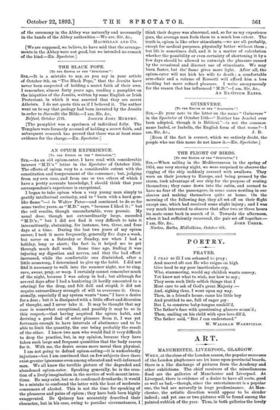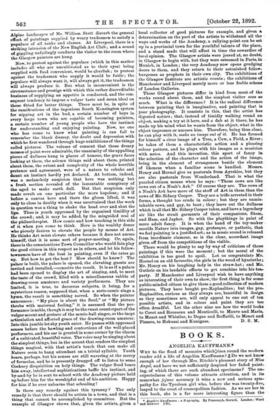ART.
MANCHESTER, LIVERPOOL, GLASGOW.
WHEN, at the close of the London season, the popular successes of the London playhouses are let loose upon provincial boards, there is a like discharge of pictures from the Academy and other exhibitions. The chief receivers of the miscellaneous flood are the galleries of Manchester and Liverpool. At Liverpool, there is evidence of a desire to have all sorts, good as well as bad,—though, since the entertainment is a popular one, the bad are naturally in huge predominance. At Man- chester, the artistic direction would appear to be slender indeed ; and yet one or two pictures will be found among the painted rubbish of the year. Thus, in both galleries the lovely
Alpine landscapes of Mr. William Stott disturb the general effect of paintings supplied by weary tradesmen to satisfy a populace of all ranks and classes. At Liverpool, there is a striking intrusion of the New English Art Club ; and a sound of giggling unfailingly conducts the visitor to the room where the Glasgow painters are hung.
Now, to protest against the populace (which in this matter includes all who are uncultivated as to their eyes) being supplied with food convenient, would be churlish ; to protest against the tradesmen who supply it would be futile ; the populace will always want it, will always get it, the tradesmen will always produce it. But what is inconvenient is the circumstance and prestige with which this rather discreditable business of supplying an appetite is conducted, and the con- sequent tendency to impose a vulgar taste and mean ideal on those fitted for better things. There must be, in spite of the ramifications of the ingenious South Kensington system for nipping art in the bud, a certain number of boys in every large town who are capable of becoming painters, a certain number of young people who have the instinct for understanding and enjoying painting. Now, no one who has come to know what painting is can fail to remember the blank dismay, the doubt and depression with which he first wandered through huge exhibitions of the things called pictures: The volume of consent that those dreary messes of paint were admirable, the unanimity of the appalling pieces of dullness hung in places of honour, the grave faces looking at them, the solemn things said about them, printed about them, the extent and complexity of the whole horrible pretence and agreement, were of a nature to rebuke and daunt an instinct hardly yet declared. At bottom, indeed, was a melancholy suspicion that here was nothing but a fresh section revealed of the lamentable conspiracy of the aged to make earth dull. But that suspicion only made revolt on one particular the more hopeless ; and if before a canvas here and there the gloom lifted, it was only to close in doubly when it was ascertained that the work in question was a thing to shake the head over and shut the lips. Thus is youth oppressed by the organised timidity of the crowd; and, it may be added, by the misguided zeal of the philanthropist. How comic and how touching is this side of it when you come to think. Here is the wealthy donor who piously desires to elevate the people by means of Art. He thinks Art must elevate others because it does not amuse himself, that it is some sort of prayer-meeting. Or, again, there is the conscientious Town Councillor who would fain play the good citizen in this respect as in others, and let his fellow. townsmen have of the best in painting, even if the rates go up. But how to get the best ? How should he know ?- The palace is built, the palace is opened, the elevating guests are invited and installed,—conceive the result. It is as if a palace had been opened to display the art of singing, and, to meet the taste of the crowd, filled with a miscellaneous rabble of drawing-room amateurs and variety performers. They are limited, it is true, to decorous subjects, it being, for a mysterious reason, supposed that, when a serio-comic sings a hymn, the result is something sacred. So when the painter announces : "My piece is about the Soul," or "My picture throbs with maternal feeling," it is assumed that the per- formance is noble, though it may be the exact counterpart of the vulgar accent and gesture of the music-hall singer, or the inept articulation and affected grace of the drawing-room amateur. Into this jumble let shy youth enter. He passes with oppressed senses before the bawling and contortions of the well-placed performers, and his ear is greeted in some corner by the charm of a cultivated, beautiful voice. The voice may be singing about the simplest things, but in the accent that renders the simplest things magical, with that artist's touch that can make all Nature seem to bang attendant on a trivial syllable. Youth bears, perhaps, but his senses are still wavering at the mercy of formulas, and he is presently dragged off to listen to some Cockney disquisition on holy things. The vulgar flood bears him away, intellectual sophistications baffle his instinct, and by-and-by be is sent to school with the Academy picture held up before him for the worshipful end of his ambition. Happy for him if he ever unlearns that schooling !
Is there any remedy against this tyranny ? The only remedy is that there should be artists in a town, and that is a thing that cannot be accomplished by committee. But the example of Glasgow shows that, given the artists, given a local collector of good pictures for example, and given a determination on the part of the artists to withstand all the ways and works of the Academy, a rallying-point can be set up in a provincial town for the youthful talents of the place, and a stand made that will affect in time the cowardice of local opinion. The Glasgow artists were jeered at, no doubt, in Glasgow to begin with, but they were esteemed in Paris, in Munich, in London ; the very Academy now opens grudging doors to them, and they return to their astonished fellow. burgessesas prophets in their own city. The exhibitions of the Glasgow Institute are artistic events ; the exhibitions of Manchester and Liverpool merely more or less feeble echoes of London Galleries.
Those Glasgow pictures differ in kind from most of the works round about them, and the simplest visitor sees so much. What is the difference ? It is the radical difference between painting that is imaginative, and painting that is poor photography. It consists in this, that the artist has digested nature ; that, instead of timidly walking round an object, making a try at it here, and a dab at it there, he has made up his mind what he wants from the object, what in the object impresses or amuses him. Therefore, being thus clear, he can play with it, make an image out of it. He has formed for himself a clear image of a Tree, a Cow, a Field, a River; he takes of them a characteristic action and a pleasing colour pattern, and he plays with his images as a musician with notes. And this invention, this sport of fancy in the selection of the character and the action of the image, bring in the element of strangeness beside the element of likeness when a familiar scene is handled. Messrs. Henry and Hornel give us pastorals from Ayrshire, but they are also pastorals from Wonderland. That is what the puzzled citizen means when he says : "Those cows are like cows out of a Noah's Ark." Of course they are. The cows of a Noah's Ark have more of the stuff of Art in them than the cows of Mr. Sidney Cooper. They are a trifle arrested in their forms, a thought too crude in colour ; but they are unmis- takable cows, and gay, to boot ; they leave out the dullness which is all that Mr. Sidney Cooper takes, and have a legendary air like the strait garments of their companions, Shem, and Ham, and Japhet. So with the playthings in paint of more adult fancy. It is when the hand of the toy-maker moulds Nature into images, gay, grotesque, or pathetic, that we feel painting is a justified art ; as in music sound is released from inordinate clamour, so is the clear, accordant image given off from the competitions of the visible.
There would be plenty to say by way of criticism of those paintings if this were the moment ; but the moral of the exhibition is too good to spoil. Let us congratulate Mr. Hornel on an old favourite, the girls in the wood of hyacinths ; Mr. Henry on his laughing lady in the straw-hat ; and Mr. Guthrie on his laudable efforts to get sunshine into his tea.. party. If Manchester and Liverpool wish to have anything as interesting of their own to show, the first thing is for some public-minded citizen to give them a good collection of modern. pictures. They have bought pre-Raphaelites; but the pre- Raphaelites, curious as they always are, beautiful in design as they sometimes are, will only appeal to one out of ten. possible artists, and in colour and paint they are too often dreadful. Let the other nine see how the world looks to Corot and Rousseau and Monticelli, to Mauve and Maria, to Manet and Whistler, to Degas and Raffaelli, to Monet and Pissaro, to Hokusai and Kunigasa. D. S. M.







































 Previous page
Previous page